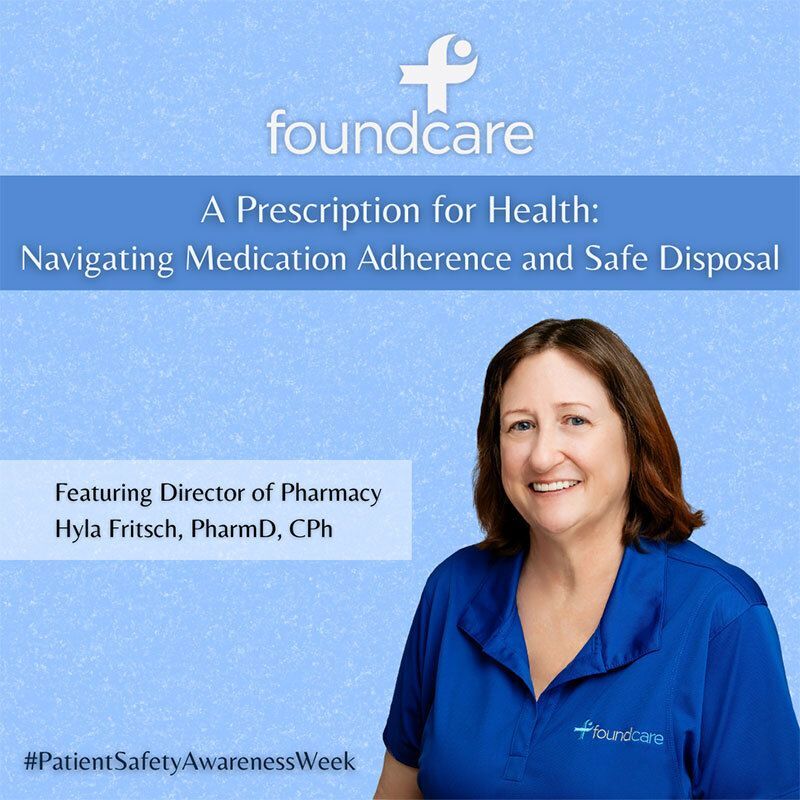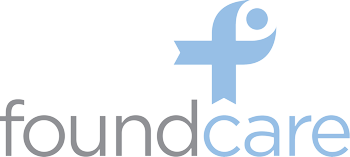
Patient Safety Awareness Week is observed every year in March. This year’s theme, “Safer Together,” underscores the significance of safety across an entire healthcare team, including providers, administrative staff, and patients. Although we are using this week in March to celebrate our patient safety achievements and increase awareness, safe care is FoundCare’s focus every day.
Medication adherence and responsible disposal of medications are crucial aspects that contribute to safeguarding our community's health and welfare. We sat down with our Director of Pharmacy, Hyla Fritsch, to gather some valuable insight on the importance of following medication instructions and finding ways to deal with difficulties in taking medicines as prescribed.
Safe use of Medication:
Medication adherence means sticking to your doctor's instructions and taking your medicine the way you are supposed to. The consistent and correct use of prescribed medications plays a large role in managing chronic conditions, preventing the progression of diseases, and achieving optimal health outcomes.
"Not following a treatment plan happens a lot with patients, and it's because of things like forgetting, finding it too hard to keep up with the instructions, and sometimes even choosing not to stick to the plan on purpose,” said Hyla.
Hyla recommends the following tips for taking your medication properly:
- Read all the information on the medicine label and follow the directions. Do not take medication more often or in greater amounts than as written on the package. You can establish a regular schedule by linking medication intake with your daily routines, like meals or bedtime.
- Always measure the right amount using the dosing device (oral syringe or dosing cup) that comes with the medicine. Organize medications in pill organizers labeled with the days of the week or times of day to help keep track of doses.
- If you do not have a dosing device, ask the pharmacist for one. We are happy to ensure you have the proper supplies to safely consume your medication. Do not use household spoons to measure medicine since they come in so many different shapes and sizes.
- Use alarms or reminders on your phone, watch, or other devices to remind you to take your medication at specific times.
- Always ask questions and communicate challenges or concerns! If you do not understand the instructions on the label, how to use the dosing device, or find your medication regime too challenging, talk to your pharmacist or doctor before taking the medicine.
Store Medicines Safely
Each year, thousands of children and adults are treated in emergency departments after finding and ingesting medicine, or accidentally consuming the wrong amount. By storing your medication safely, you are taking an important step in maintaining your health and preventing potential risks associated with improper storage.
“After taking the correct dosage of medication, it's crucial to promptly return the medicine to a safe storage location. This helps prevent accidental misuse or ingestion by others, especially children or pets who might accidentally get hold of it. Proper storage also ensures that the medication maintains its effectiveness by protecting it from exposure to light, heat, moisture, or other environmental factors that could degrade its potency,” said Hyla.
When storing medication, Hyla suggests the following:
- Choose a safe spot: Walk around your house to find the safest place to keep your medicines. The location should be out of sight and out of reach of young children. It should also be within safe reach of adults where they can safely access.
- Lock the safety cap: Always relock the cap on a medicine bottle. If the bottle has a locking cap that turns, twist it until you hear the click or cannot twist anymore. This will limit accessibility to small children and preserve the medication's quality.
- Teach your loved ones about medicine safety: Explaining to children what medicine is and why you or a trusted adult must be the one to give it to them helps reduce the negative stigma surrounding medicine and limits the instances of accidents involving medication. Never tell children medicine is candy to get them to take it, even if they do not like to take their medicine.
- Speak up about potential side effects: Inform your loved ones or caretakers of the potential symptoms of the medication you are taking so they can know what to look for in case of a medical emergency. Side effects are typically required to be listed on medication bottles or packaging. This information is essential for patients to be aware of potential risks associated with taking the medication.
Safely Dispose of Unused or Expired Medicine
“The best disposal method for most unused or expired medications is to drop off the medicine at a drug take-back site, location, or program,” said Hyla.
“If you cannot access a drug take-back location and your medicine is on the FDA flush list, your next best option is to flush the medicine down the toilet. Do not flush medication down the toilet or sink unless specific instructions indicate it is safe to do so or you have verified it is on the FDA flush list, as this can contaminate water sources,” Hyla continued.
For medication not on the flush list, Hyla recommends following these instructions to discard the medicine in your trash at home:
- Before disposing of the medication, ensure to remove any personal information from the packaging, such as your name or prescription number, to protect your privacy.
- Mix the medication with an undesirable substance such as coffee grounds, cat litter, or dirt. This helps to make the medication less appealing to animals or people who might accidentally find it.
- Place the mixture in a container such as a sealed plastic bag to prevent it from leaking or spilling.
- Place the sealed bag or container in your household trash. Do not flush medication down the toilet or sink unless specific instructions indicate it is safe to do so, as this can contaminate water sources.
By following these steps, you can safely dispose of prescription medicine at home while minimizing the risk of accidental ingestion or environmental contamination.
Be Prepared In Case Of An Emergency.
If you suspect that you or your child have ingested medication that may be defective, taken something you shouldn't have, or believe you may have overdosed, it's crucial to call the poison control center immediately at 1-800-222-1222, even if you are uncertain.
In honor of Patient Safety Awareness Week, let's remember how crucial it is to take our medications correctly and store them safely. By following the instructions from our doctors, storing our meds in the right place, and asking for help when needed, we are not just looking out for our own health, but also making sure we stay safe. Let us use this week to remind ourselves to be careful with our medications and keep our health a top priority.
